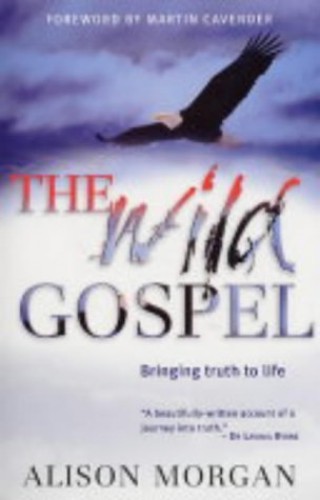First of all, a very Happy New Year to you all and it is my fervent hope that 2023 will be a bit more structured and less chaotic than the year we have just had – certainly on the political front! With our new Monarch publicly professing the importance of faith and the light which faith brings in our service to others, he set the tone for what his reign will represent in terms of the multi-faith and multi-cultural United Kingdom we live in today. Regardless of whatever faith we follow or practice, there can be no doubt that the march of secularisation continues so this year more than any other, there is a clear need to revitalise our Gospel as the primary source that brings the light of Christ into the world.

Thinking about this need I was reminded of a sermon I gave last Pentecost while on holiday in Cornwall which featured reflections drawn on this book, The Wild Gospel[1], by Rev Dr Alison Morgan which is almost twenty-years old but is just as powerful and relevant for today. In her book, she describes the postmodern culture we find ourselves in, culture being defined as a shared way of thinking and living. Jesus challenged the culture of his day, he was abrasive and rude to the religious authorities in particular calling them out for their hypocrisy, yet today we seem reluctant to challenge our prevailing culture or offer a viable alternative. Why is this? Drawing both on material from her book used in the sermon and from my own observations, I offer some potential reasons and suggest possible ways to remedy the situation.
Many of us bemoan the cult of individualism, where the previous ties of community and place, taking responsibility for how we live through our work ethic and supporting each other to some has now become a distant memory. Those previous relationships between people often forged – particularly among the poorest – in adversity have as we have become more materially wealthier, led to a rejection of the values of faith and belief. Where a culture now exists that the majority declare religious belief is no longer relevant to them or their how they live their lives, at least while they continue to enjoy the good times.
We seem to be in a situation where the mainstream Christian churches have ceased to have any relevance, but instead of adapting the message of the gospel to the prevailing times, it tries to adapt chameleon-like to its surroundings, to blend in and bend toward this prevailing culture in the hope that by doing so they may still be considered relevant. While Jesus himself came to earth to help re-set the relationship between God and his people, our Gospel of Christ has seemingly lost its ability to transcend culture and every once in a while it needs a kick up the behind to remind ourselves of it. We therefore need as Dr Morgan says, to look beyond the culture and reach out to the individuals within it, just like Jesus did when he chose his first disciples to help carry the word of God. My own faith, Methodism, came about because John Wesley recognised that the spiritual welfare of the working classes particularly in rural areas, were being ignored by the established church ministers of the day.
The post-modern period we find ourselves in has been described as looking for answers but not having yet found them. Our culture is now basically saying, “fill your boots, get the most of what you can while you can.” We seem to have lost our way and to reflect on the true meaning of life, to the truth offered by faith in God and in his son, Jesus Christ.
Yet we have at our disposal the ideal tool with which to lead revitalise our church and our faith and to provided real meaning especially to those who find themselves struggling with life in general, and yet for the most part, we fail to recognise it.
On p.238 or her book Morgan quotes Mahatma Gandhi, not a Christian but somebody influenced by the gospel accounts in particular the Sermon on the Mount from Matthew’s gospel. He said this:
“You Christians look after a document containing enough dynamite to blow all civilisation to pieces, turn the world upside down and bring peace to a battle-torn planet. But you treat it as though it is nothing more than a piece of literature.”
How have we have allowed the Gospel to become so devalued? When it comes to challenging the prevailing culture the answers to many of our problems can be found within Holy Scripture. “Do not be like them” says Matthew in the beatitudes 6:8, or Paul in Romans 12 when he says, “Do not conform to the pattern of the world but be refreshed by the renewing of your minds and discern what is acceptable to God.” Matthew again in 22:37-39, “Love the Lord your God with all your heart, mind, body and soul and love your neighbour as yourself.” It sounds simple yet we seemingly cannot bring ourselves to accept it as fact.
To be effective means learning to communicate the language of the Gospel into the language of the culture. We must adapt our message including how we share it. We cannot expect the people simply to want to come to church, we need to give them a compelling reason, and we do this by taking the church including the Gospel out to them first using all means at our disposal.
Sometimes standing against the prevailing culture still carries the same risks that it did for Jesus and his Disciples and for many others since. But this should not prevent us from asking the Holy Spirit for the help and guidance we need to bring the Gospel back to life, to make it relevant especially after our experiences of the past couple of years which HAS caused some people, to reflect on what is really important in life.
Another guiding principle – not a new one by any means – when seeking to spread the Gospel is that of Double Listening. Listening to God through the scriptures but also listening to the voices of the people around us. Very often these are contradictory. For example, some of us have found great difficulty in accepting and understanding some of the more modern ethical views regarding marriage and relationships generally whether they were same-sex or hetro-sexual. Even though Jesus himself quoted on the traditional teaching about marriage and divorce he does say in Matt 19:6, “What God has joined together, let no-one separate.” Should these words perhaps not apply to all types of relationships today if our faith is to be considered as being grounded in reality? For if God has brought two people together in a loving union, however that union is established, should we now not be using scripture to celebrate this fact?
To listen to the Holy Spirit means according to Morgan to being open to change, to try new things, to be creative and controversial if needs must. The Holy Spirit will speak to each of us as individuals as well as churches in ways that are appropriate to what is needed. The best churches will I feel be those built on relationships rather than hierarchies, but we still need spiritual guidance to stay on the path of true discipleship. Our circumstances today are vastly more different compared to first century Palestine, our challenges are far more complex and therefore arguably, much more interesting but faith still needs to be grounded in the same reality of our time as it was in theirs.
We are meant to be doers of the word not merely hearers who deceive themselves (Jas 1.22). It goes without saying that our credibility as Christians, as advocates of God’s holy word, is diminished if we fail to practice what we preach. And just like the Apostles on that first Pentecost, it is through our words and our deeds, that we too can fulfil that purpose; to make us more like Christ.
May we walk as children of light, and never wander from our holy calling.
[1] Morgan, Rev Dr Alison. The Wild Gospel, Bringing Truth to Life (Oxford: Monarch Books, 2004)
